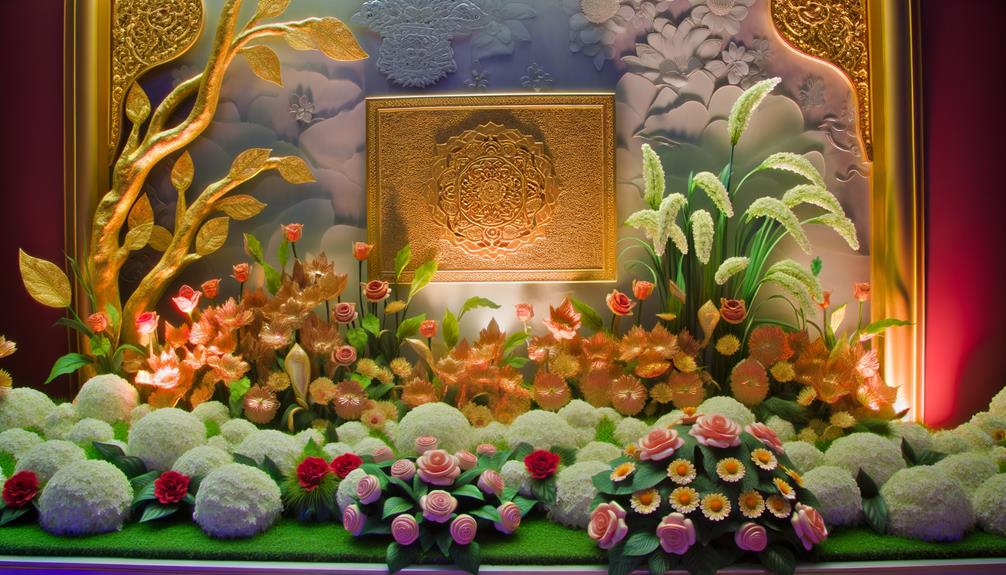Fareed Name Meaning in English
The name Fareed, rooted in Arabic etymology, means 'unique' or 'one of a kind.' It signifies unparalleled distinction and is often associated with exceptional qualities. Historically, it has deep ties to Islamic culture, borne by scholars, poets, and leaders.
The name emphasizes individuality and moral integrity, with a strong cultural resonance in both religious and literary contexts. Variations like Farid and Faridah also carry similar meanings.
Choosing the name Fareed reflects a desire to imbue wisdom, uniqueness, and excellence. Explore more to uncover its full cultural and historical significance.

Key Takeaways
- Fareed means 'unique' or 'one of a kind' in Arabic.
- The name signifies individuality and exceptional qualities.
- Historically linked to scholars, poets, and leaders in Islamic culture.
- Symbolizes moral integrity and singularity in literature.
- Reflects values of excellence and distinctiveness in Islamic society.
Origin of the Name Fareed
The name Fareed, rooted in Arabic etymology, carries a rich historical significance dating back to ancient Islamic culture. It has been a prominent name among Muslim communities, reflecting a deep connection to heritage and tradition. Historically, the name has been borne by scholars, poets, and leaders, embedding it within the cultural and intellectual fabric of Islamic society.
The linguistic origins can be traced to classical Arabic, where names often held profound meanings and were chosen with great care. Its usage across generations underscores its enduring appeal and the cultural importance placed on names that convey a sense of identity and lineage. Understanding its origin offers insight into the cultural and historical contexts that shaped its enduring legacy.
Meaning in Arabic
In Arabic, the name Fareed holds significant linguistic and cultural value, denoting uniqueness and rarity. Its etymological roots reflect a rich historical context, often associated with individuals of exceptional qualities.
Understanding Fareed's meaning within the Arabic language framework provides insight into its broader cultural resonance and historical significance.
Arabic Language Significance
Renowned for its profound cultural and historical connotations, the name Fareed in Arabic signifies 'unique' or 'one of a kind.' This name's significance in the Arabic language is deeply rooted in the following aspects:
- Lexical Meaning: Derived from the root 'F-R-D,' it conveys singularity and exclusiveness.
- Literary Usage: Frequently found in classical Arabic poetry and prose, symbolizing exceptional qualities.
- Religious Context: Sometimes used to denote the uniqueness of divine attributes in Islamic theology.
- Social Implications: It emphasizes individuality and distinctiveness in personal identity.
Each of these points underscores how the name Fareed encapsulates a rich tapestry of meanings, reflecting the depth and beauty of the Arabic language.
Cultural and Historical Context
Embedded within centuries of Arabic history and culture, the name Fareed symbolizes a profound sense of individuality and unparalleled distinction. Derived from the Arabic root 'فَرِيد' (farīd), meaning unique or incomparable, this name has been historically associated with figures of eminence and exceptional qualities.
In the Islamic Golden Age, scholars and poets bearing the name Fareed contributed significantly to the intellectual and cultural landscape. The name evokes a sense of prestige and honor, often bestowed upon individuals expected to achieve greatness.
In contemporary times, Fareed remains a popular choice in Arabic-speaking communities, reflecting enduring values of excellence and singularity. Its cultural resonance underscores a legacy of distinction that transcends generations.
Cultural Significance
The name Fareed holds substantial cultural importance, reflecting unique characteristics and values highly esteemed within various communities. It embodies notions of individuality and distinction, often associated with intellectual and moral virtues.
The cultural significance of the name can be outlined as follows:
- Historical Legacy: Historically, Fareed has been borne by notable scholars and leaders, symbolizing wisdom and authority.
- Linguistic Roots: Originating from Arabic, the name conveys meanings such as 'unique' and 'precious,' which are valued traits.
- Religious Connotations: In Islamic contexts, Fareed is often linked with spiritual and ethical excellence.
- Artistic Influence: The name appears in literature and poetry, highlighting its aesthetic and cultural resonance.
These elements collectively underscore the rich cultural tapestry associated with the name Fareed.
Popularity Over Time
Examining the popularity of the name Fareed over time reveals significant historical trends, geographic shifts, and modern usage statistics.
Historically, the name experienced varying degrees of prominence influenced by cultural and social factors.
Contemporary data further elucidates its current popularity across different regions, providing insights into its evolving appeal.
Historical Popularity Trends
Analyzing the historical popularity trends of the name Fareed reveals significant fluctuations influenced by cultural, social, and geopolitical factors. Over the centuries, the prominence of the name has mirrored broader societal changes.
Medieval Islamic Golden Age: The name Fareed saw a surge, reflecting a period of intellectual and cultural prosperity.
Colonial Era: Popularity waned as Western influences overshadowed indigenous names.
Post-Colonial Resurgence: A revival occurred as newly independent nations embraced cultural heritage.
Modern Globalization: Increased migration and globalization contributed to variable popularity in diverse regions.
This analysis underscores how the name Fareed's historical trajectory is intertwined with significant global events, reflecting broader patterns of cultural and ideological shifts.
Geographic Popularity Shifts
Across different regions, the name Fareed has experienced varying degrees of popularity, influenced by local cultural, social, and historical contexts.
In Middle Eastern countries, particularly within Arab-speaking communities, Fareed remains a prevalent choice, reflecting deep-rooted cultural and religious significance.
Conversely, in Western nations, its adoption has been more sporadic, often coinciding with periods of increased immigration and cultural exchange.
In South Asia, particularly in countries like Pakistan and India, the name has seen steady use among Muslim communities, underpinned by historical ties to Persian and Arabic languages.
Additionally, global migration trends have contributed to the name's diffusion, enabling Fareed to gain recognition beyond its traditional strongholds.
This geographic variability underscores the dynamic nature of name popularity over time.
Modern Usage Statistics
In recent years, statistical analyses reveal a fluctuating trend in the popularity of the name Fareed, influenced by sociocultural dynamics and demographic shifts.
Detailed examination indicates that:
- Cultural Integration: Increased cultural exchange has led to greater acceptance and usage of diverse names, including Fareed.
- Media Influence: Prominent figures and media representations often impact name popularity, contributing to periodic spikes.
- Migration Patterns: Shifts in migration can introduce and popularize names in new regions, affecting their local prevalence.
- Generational Preferences: Preferences for unique or traditional names vary across generations, influencing statistical trends.
Understanding these factors is essential for appreciating the evolving nature of name popularity and its broader sociocultural implications.
Famous People Named Fareed
Several notable individuals named Fareed have made significant contributions to various fields, demonstrating the name's widespread cultural and professional impact.
Foremost among them is Fareed Zakaria, an esteemed journalist, author, and host of CNN's 'Fareed Zakaria GPS.' His insightful analyses on global affairs have garnered international acclaim.
Additionally, Fareed Ayaz, a prominent Qawwali singer, has enriched South Asian musical traditions, earning accolades for his performances worldwide.
In academia, Fareed Armaly, a distinguished artist and curator, has made substantial contributions to contemporary art discourse.
These individuals exemplify the versatility and prominence of the name Fareed across diverse professional landscapes, underscoring its association with excellence and influence.
Variations and Similar Names
Exploring variations and similar names to Fareed reveals a rich tapestry of linguistic, cultural, and regional influences that contribute to its widespread appeal. The name Fareed, meaning 'unique' or 'precious,' is mainly of Arabic origin but resonates across various cultures.
Key variations and similar names include:
- Farid: A closely related Persian and Urdu variant, retaining the original meaning.
- Farida: A feminine form, prevalent in Arabic-speaking and Muslim-majority regions.
- Faridah: An alternative spelling, common in Southeast Asia, particularly Indonesia and Malaysia.
- Fariduddin: A compound name often used in South Asia, combining 'Farid' with 'uddin,' meaning 'of the religion.'
These variations highlight the name's adaptability and its deep cultural roots, enriching its global resonance.
Name Fareed in Literature
Often celebrated in literary works, the name Fareed embodies themes of individuality and rarity, resonating deeply with the narrative arcs and character developments in various global texts.
In Middle Eastern literature, Fareed often represents a character who stands out due to exceptional qualities or wisdom, reinforcing the name's connotation of uniqueness.
Similarly, in South Asian literary traditions, characters named Fareed frequently symbolize moral integrity and singularity, often serving as pivotal figures that drive the plot forward.
The name's inherent meaning of 'unique' or 'precious' is intricately woven into these narratives, allowing authors to explore complex themes of identity and self-worth.
Through detailed character portrayals, the name Fareed consistently enhances literary richness and depth.
Personality Traits
Individuals named Fareed are frequently characterized by their distinctive qualities of wisdom, integrity, and a profound sense of uniqueness. These attributes often translate into strong leadership skills and a natural inclination towards empathetic understanding.
Detailed analysis reveals that individuals with this name exhibit:
- Wisdom: Demonstrating profound insights and sound judgment in various situations.
- Integrity: Upholding strong moral principles and ethical standards.
- Uniqueness: Possessing a distinctive personality that sets them apart from others.
- Empathy: Showing a deep understanding and compassion for others' experiences.
These personality traits contribute to their ability to navigate complex social and professional landscapes effectively.
Choosing Fareed for Your Child
Choosing the name Fareed for your child can be a thoughtful decision that reflects a desire to imbue them with qualities of wisdom, integrity, and uniqueness. Derived from Arabic origins, Fareed means 'unique' or 'precious,' suggesting a distinct individuality.
Parents selecting this name often aspire to cultivate a sense of exceptionalism and personal distinction in their child. The name's historical and cultural significance further endows it with a timeless appeal, resonating across generations.
Additionally, Fareed's phonetic clarity guarantees ease of pronunciation in various linguistic contexts, making it both versatile and practical.
Ultimately, choosing Fareed symbolizes an intent to provide a name rich in meaning, heritage, and aspirational qualities, hence offering a profound influence on the child's identity.
Conclusion
In examining the name Fareed, its Arabic origins and unique meaning of 'unique' or 'precious' are significant.
Cultural importance is highlighted by its steady popularity and presence in literature and among notable individuals.
An interesting statistic reveals that the name Fareed has seen a consistent rise in usage in Western countries over the past two decades, emphasizing its growing global appeal.
This analysis underscores the name's enduring cultural resonance and suitability for a distinctive, meaningful choice.






